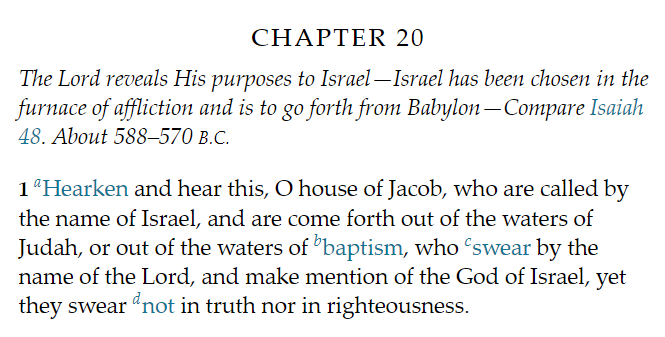
The entire chapter of 1 Nephi 20 in the #TheBookOfMormon is an altered text of the entire chapter of Isaiah 48 from the King James Version of the Bible. Here's a screenshot of the beginning of 1 Nephi 20. 

Notice the textual similarities between 1 Nephi 20:1 [ churchofjesuschrist.org/study/scriptur… ] and Isaiah 48:1 in the KJV [ biblegateway.com/passage/?searc… ]
Isaiah 48:1 (KJV) Hear ye this, O house of Jacob, which are called by the name of Israel, and are come forth out of the waters of Judah, which swear by the name of the Lord, and make mention of the God of Israel, but not in truth, nor in righteousness.
1 Nephi 20:1 "Hearken and hear this, O house of Jacob, who are called by the name of Israel, and are come forth out of the waters of Judah, or out of the waters of baptism, ...
... who swear by the name of the Lord, and make mention of the God of Israel, yet they swear not in truth nor in righteousness."
1 Nephi 20:1 takes the phrase "come forth out of the waters of Judah" and inserts the phrase "or out of the waters of baptism,"
The KJV is altered from its origin meaning to affirm the trip of Nephi across the many waters of the Atlantic to North America.
The KJV is riddled with textual problems, and one interesting change in the NRSV is the omission of any reference to waters at all. Instead, it says "came forth from the LOINS of Judah".
Isaiah 48:1 NRSV "Hear this, O house of Jacob,
who are called by the name of Israel,
and who came forth from the loins of Judah;
who swear by the name of the Lord,
and invoke the God of Israel,
but not in truth or right."
who are called by the name of Israel,
and who came forth from the loins of Judah;
who swear by the name of the Lord,
and invoke the God of Israel,
but not in truth or right."
This demonstrates a direct dependence of 1 Nephi 20 upon textual errors that originated in the KJV that have since been corrected in modern english translations.
Furthermore, the header of 1 Nephi 20 (see the screenshot) claims that this prophecy from Isaiah is from "About 588–570 B.C." when in reality Isaiah 48 originated from Deutero-Isaiah several centuries LATER.
1 Nephi 19:23 states that these words (really from the KJV variants of Deutero-Isaiah) is from the prophet Isaiah "I did read unto them that which was written by the prophet Isaiah; for I did liken all scriptures unto us,"
And this is only one example from 1 Nephi 20, but the rest of the entire chapter shows similar dependence upon the erroneous accretions in the KJV's translation of Isaiah 48..
A fascinating part of 1 Nephi 20 is that specifically includes Isaiah 48 because of the references to waters, and expands it to include baptism, to affirm the truth of Nephi's journey across "many waters" to America (a theme textual criticism has proved absent from DeuteroIsaiah)
• • •
Missing some Tweet in this thread? You can try to
force a refresh





